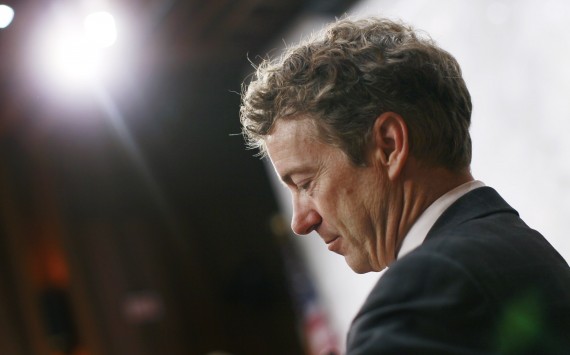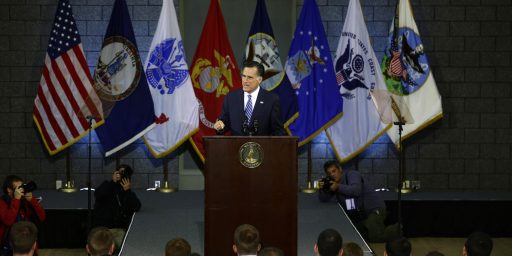Rand Paul Criticizes Romney’s Foreign Policy Speech
One of Mitt Romney's own supporters didn't like his foreign policy speech very much.
Kentucky Senator Rand Paul endorsed Mitt Romney several months ago, much to the chagrin of many hardcore supporters of his father, but as much as he said he supports Romney, he’s spent plenty of time criticizing his party’s nominee. Most recently, that comes in the form of an Op-Ed for CNN in response to Romney’s foreign policy speech at VMI earlier this week:
This week, I will campaign for Gov. Mitt Romney. I believe this election will and should be about moving America back from the edge of the abyss on which we stand, where our debt and spending threaten to overwhelm and drown us. Romney’s belief in free markets, limited government and trade make him the clear choice to lead our country come January.
I do not, however, support a call for intervention in Syria. And, if such intervention were being contemplated, it is absolutely necessary that Congress give any such authority to the president. No president, Republican or Democrat, has the unilateral power to take our nation to war without the authority of the legislature.
At times, I have been encouraged by Romney’s foreign policy. I agree with his call to end the war in Afghanistan sooner rather than later and with his skepticism of, and call for reform in, foreign aid, but I am a bit dismayed by his foreign policy speech Monday, titled “Mantle of Leadership.”
(…)
While I would always stand up for America and preserve our ability to defend ourselves, a less aggressive foreign policy along with an audit of the Pentagon could save tens of billions of dollars each year without sacrificing our defense. To dismiss either idea is to miss the very compromise that will enable us to balance our budget. That compromise would be for conservatives to admit that not every dollar spent on the military is sacred or well-spent and for liberals to admit that not every dollar spent on domestic entitlements and welfare is necessary.
In North Africa and the Middle East, our problem has not been a lack of intervention. In the past 10 years we have fought two full wars there, and bombed or sent troops into several others.
This past year, President Obama illegally began a war with Libya, taking sides with the rebels to unseat an admittedly bad man in Moammar Gadhafi. There were several problems with this policy: First, the president did not seek or get the necessary constitutional authority from Congress for this military action. If our Constitution is to mean anything it must be applied even in times of war, when those seeking to exercise power do not find it expedient.
Just as importantly, the Libyan rebels were assisted with virtually no one in the administration or in Congress demanding to know who these people were that we were arming and propping up. No one seemed to understand that in toppling Libya’s dictatorship, we were leaving in its wake an unformed, unorganized government without a centralized structure, one that would have a difficult time keeping order among the more than 100 tribes that make up Libya.
This “act first, think later” foreign policy has real consequences. We’ve seen our embassies and consulates stormed in more than one country. Our diplomats and security team were killed. Our flag is being burned, our country mocked.
The proper response to this would be to step back and think of whether we really need to be involved in these countries in the way we have been. Instead, both parties rush headlong into more places they don’t understand, exemplified Monday by Romney urging action to arm Syrian rebels and topple President Bashar al-Assad.
But just who are these rebels? What will they do when in power? Is this really in our vital national interest?
These are, of course, exceedingly important questions that none of the advocates for increased American involvement in Syria seem to be able to answer. We barely asked that question when we joined several of our NATO allies to intervene in the Libyan civil war, and we learned exactly one month ago today what the consequences of that might be. Qaddafi was a bastard who is thankfully gone, but it’s undeniable that Libya remains a nation in chaos. The eastern portion of the country, and likely the vast deserts of the south, is now fertile breading ground, and excellent hideout territory for militants sympathetic to the message once preached by Osama bin Laden. Militants from Libya have spent the last year causing significant trouble in Mali and other African nations.
Let’s just imagine for a second what that would look like transferred to Syria, a nation made up of Sunni and Shia Muslims, Alawites, and Christians, and bordered by Lebanon, Jordan, Iraq, and Israel. The prospect for utter chaos if the transition to a post-Assad Syria, which seems inevitable at this point, isn’t handled properly seem to be quite grim indeed. Add into all of that the increased tensions between Syria and Turkey, and you’ve got a recipe for potential disaster that suggests to me that getting involved doesn’t make very much sense at al.
Paul continues:
I am not an isolationist or a pacifist. I heartily reject both labels. I believe in engagement in the world, with trade, commerce, diplomacy and a foreign policy that projects the greatness of America and her people. I would not hesitate to vote to send American troops to war to protect our country and our vital national security interests.
But we are in too many places, too often, and we don’t seem to even know the reason — or where we will end up when we’re done. This foreign policy has created more enemies than it has vanquished. It has siphoned trillions of America’s dollars. It has cost tens of thousands of casualties in the loss of the lives and limbs of our soldiers.
We owe it to ourselves, our soldiers and our children to take a more careful look at our foreign policy, to not rush into war, and to not attempt to score political points with wrongheaded policy ideas.
This isn’t the first time that Senator Paul has distanced himself from his party’s nominee on foreign policy issues. He hit on many of these same themes in his convention speech and in interviews afterwards. More importantly, though, he’s absolutely correct. We’ve spent the last decade spending at least a trillion dollars fighting two wars that, in the end, turned out to be complete failures. In the process, we have engaged in tactics ranging from “enhanced interrogations,” our euphemistic term for torture, to drone strikes that have ended up killing more civilians than terrorists in a manner which have undoubtedly increased the amount of hatred directed against us from a part of the world that already hated us quite enough thank you. Perhaps it’s time to try something different.







Isn’t that sort of like saying “RuPaul criticizes Mila Kunis’ figure?”
hmmm…what do you know.
the last speech i heard from Paul was at the RNC convention…and it was full of lies and distortions.
but it’s true…even broken clocks are right twice a day.
Syria has become a Shia -Sunni war – a proxie war between Iran and Saudi Arabia.
Here’s your Dukakis moment:
http://nymag.com/daily/intel/2012/10/paul-ryan-weight-photo-time-p90x.html
Yeah…I want that guy weighing in on Foreign Policy.
RINO!
Rand seems to have adopted most of his father’s foreign policy views. Too bad his sensible approach is out of fashion.
Paul says:
Is the “end the war in Afghanistan sooner rather than later” for reals? Or is that just one flip of the flop?
@this:
No, as I read the Romney for President site, he is for occupation:
That foreign policy speech was an odd call–no one paid any attention to it except those who would find it lacking.
In an odd way, Romney’s campaign is mimicking Obama’s 2008 campaign.
Big, lofty goals without an explanation of how they would be reached
Change, hope, optimism.
And, Romney’s best asset right now is the (perceived) awesomeness of Mitt Romney, he-man debate champion and white collar alpha male extraordinaire, who is running rampant in national polls.
Who?
@bk:
Exactly.
Until Rand Paul has a coalition in the GOP Caucus of the Senate of >1, it doesn’t much matter what he thinks.
Everything I’ve read about Romney’s foreign policy makes me glad he’s a serial liar.
One of these days more fiscal conservatives are going to have to stand up and admit to their party that war is big government and the military isn’t a jobs program if they ever want to be taken seriously by thinking people.